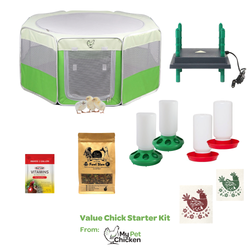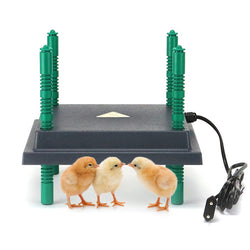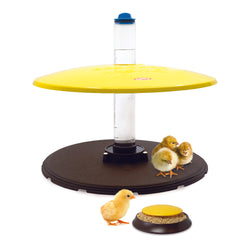What Can Chickens Eat? The Ultimate Guide to Safe and Unsafe Foods for Your Flock
Back to blog
What Can Chickens Eat? The Ultimate Guide to Safe and Unsafe Foods for Your Flock
As chicken keepers, we all want to give our feathered friends a diet that’s both nutritious and delicious. But not all human foods are safe for chickens, and feeding them the wrong things can lead to serious health issues. Whether you're a new chicken parent or a seasoned pro, it’s essential to know what’s safe to feed your flock and what to avoid.
Here’s a comprehensive guide to the most commonly searched safe and unsafe foods for chickens. Bookmark this list and keep it handy for future reference!
Safe Foods for Chickens
These foods are great for chickens, offering a mix of vitamins, minerals, and tasty variety:
Fruits
-
Berries (Blueberries, Strawberries, Blackberries): Packed with antioxidants and vitamins. Serve in moderation as a treat.
-
Watermelon: A summertime favorite! High in water content, it keeps your chickens hydrated.
-
Bananas: A soft treat that’s rich in potassium. Mash them for younger chickens.
-
Apples: Offer apple slices but avoid seeds—they contain small amounts of cyanide.
-
Pineapple: A tangy treat full of vitamin C. Remove the tough skin.
-
Mango: Sweet and soft, but avoid the pit as it’s tough to digest.
-
Papaya: Excellent for digestion and rich in vitamins.
-
Peaches and Nectarines: Offer the flesh, but remove the pits.
-
Cantaloupe and Honeydew: Chickens love the flesh and seeds of these melons.
-
Cherries: Remove the pits and let your flock enjoy this treat
-
Apricots: Rich in vitamins A and C, which boost immunity and promote healthy skin and feathers.
-
Cranberries: Provide fresh or dried (unsweetened) cranberries. Avoid sugary versions like cranberry sauce.
-
Plums: Remove the pits and chop into bite-sized pieces for easy eating.
-
Grapes: Grapes are hydrating and packed with natural sugars, vitamins C and K, and antioxidants, which help boost your flock’s energy and overall health. Cut grapes into halves or quarters to prevent choking, especially for younger chickens.
Vegetables
-
Carrots: Serve raw, grated, or cooked. Chickens love the crunch!
-
Lettuce (Romaine and Leafy Greens): A low-calorie snack packed with nutrients. Avoid iceberg lettuce—it’s low in nutrition.
-
Pumpkin and Pumpkin Seeds: Full of vitamins and believed to act as a natural dewormer.
-
Sweet Potatoes: Cooked sweet potatoes are rich in nutrients and safe to eat.
-
Zucchini: Chickens enjoy zucchini raw or cooked. The seeds are especially loved.
-
Cucumber: Hydrating and crunchy, especially refreshing in hot weather.
-
Beets and Beet Greens: Packed with nutrients; serve raw or cooked.
-
Kale: A superfood for chickens, loaded with vitamins and minerals.
-
Broccoli and Cauliflower: Offer raw or steamed for a nutritious snack.
-
Peas: Fresh or frozen, these are a protein-rich treat.
-
Spinach: A great source of vitamins but feed in moderation due to its oxalic acid content.
- Cooked Squash: Butternut, acorn, or spaghetti squash are all excellent choices.
-
Asparagus: Rich in vitamins K and C. Serve raw or cooked, chopped into smaller pieces for easy eating.
-
Brussels Sprouts: A great source of fiber and antioxidants. Offer cooked or raw, and break them into smaller chunks for better access.
-
Cabbage: Contains vitamins C and K and can act as a boredom buster when hung in the coop.
-
Peppers: High in vitamin C and beta-carotene, bell peppers support strong feathers and immune health. Hot peppers are also safe to feed chickens in moderation since they do not have capsaicin receptors.
-
Okra: Serve raw or cooked, slicing into small pieces for easier consumption.
-
Radishes (Roots and Greens): Radishes are hydrating and contain vitamin C, while their greens are rich in calcium.
Grains and Seeds
-
Cooked Rice and Pasta: Simple, plain grains without sauces or seasonings are a filling treat.
-
Oats: Rolled oats or oatmeal make a warming treat on cold mornings.
-
Sunflower Seeds: A protein-rich snack that chickens will peck happily.
-
Quinoa: (Cooked) High in protein and amino acids, it’s a healthy addition to their diet.
-
Barley: A hearty grain to mix into their scratch feed.
-
Millet: Small, crunchy grains that are easy for chickens to eat.
-
Corn (Cooked or Cracked): A favorite energy-boosting treat, but feed in moderation.
-
Flaxseeds: Rich in omega-3 fatty acids, but grind them for better digestion.
-
Cooked Lentils: A great source of protein when fully cooked.
Protein Treats
-
Mealworms: A chicken favorite! High in protein and great for molting hens.
-
Scrambled Eggs: Offer cooked eggs as a protein boost, but don’t serve raw eggs—it may encourage egg eating.
-
Fish (Cooked, Unseasoned): A great source of omega-3 fatty acids.
-
Plain Yogurt: Packed with probiotics for gut health. Offer in moderation to avoid digestive upset.
-
Cottage Cheese: A calcium-rich snack for laying hens.
-
Shrimp and Shellfish (Cooked): A great protein boost, but avoid giving shells.
-
Grasshoppers and Crickets: Natural foragers' delights and high in protein.
Miscellaneous Safe Foods
-
Herbs (Mint, Basil, Parsley, Cilantro, Dill): Many fresh herbs are loved by chickens and may even have health benefits.
-
Edible Flowers (Marigolds, Nasturtiums, Dandelions): Bright and nutritious treats for your flock.
- Nuts (Almonds, Walnuts, and Peanuts): Break walnuts into small, manageable pieces. Avoid any that are salted or flavored.
- Garlic (Raw or Powdered): Garlic is a natural immune booster with antibacterial and antiparasitic properties. It may help prevent worms and improve respiratory health in chickens.
Unsafe Foods for Chickens
Steer clear of these foods to keep your flock healthy and safe:
Toxic Plants and Vegetables
-
Avocado (Pit and Skin): Contains persin, a toxin that can be fatal to chickens.
-
Raw or Dried Beans: Raw beans contain lectins, which are highly toxic to chickens.
-
Green Potatoes and Tomato Leaves: These parts of the plant contain solanine, a harmful toxin.
-
Onions: Can cause digestive issues in chickens.
-
Rhubarb Leaves: High in oxalic acid, which is poisonous to chickens.
-
Eggplant Leaves: Like tomato and potato leaves, they contain solanine.
-
Cherry Pits and Leaves: Contain cyanide, which is toxic to chickens.
-
Wild Mushrooms: Some varieties are toxic, so it’s best to avoid all mushrooms.
Sugary, Salty, or Processed Foods
-
Chocolate: Contains theobromine and caffeine, both toxic to chickens.
-
Candy and Sweets: Chickens don’t need the added sugar, which can lead to obesity and health problems.
-
Chips and Salty Snacks: High sodium levels can harm your chickens' health.
-
Bread: While not toxic, it offers little nutritional value and can cause crop issues if overfed.
-
Ice Cream: High sugar and dairy content can upset their digestion.
-
Breakfast Cereal: Unless it’s unsweetened and whole-grain, most cereals are too sugary.
Harmful Grains and Legumes
-
Raw Peanuts: Contain aflatoxins, which are harmful to chickens.
-
Uncooked Quinoa: The saponins in raw quinoa can upset digestion.
-
Bread Dough (Raw): Expands in the crop and can cause blockages.
Miscellaneous Unsafe Foods
-
Moldy or Spoiled Food: Always avoid giving chickens food that has gone bad, as it can lead to poisoning.
-
Alcohol and Caffeine: Both are toxic and can cause severe health problems.
-
Raw Eggs: Can lead to egg-eating habits and the risk of foodborne illness.
-
Citrus Fruits: The high acidity can disrupt digestion if given in large amounts.
-
Raw Bacon or Fat: Contains harmful bacteria and too much fat.
Surprising Foods Chickens Can and Cannot Eat
Safe in Moderation
- Cheese: Feed sparingly due to high fat content.
- Popcorn: Unsalted and unbuttered, it’s a fun snack.
- Potatoes (Cooked, No Green Skin): Boiled or mashed potatoes are fine, but avoid any green parts.
-
Raisins: Offer in moderation because of their concentrated sugar content. Soak them in water if they’re too hard for easier pecking.
- Pickles (In Moderation): Pickles are hydrating and can be a novelty treat due to their salty tang. Choose low-sodium, unsweetened pickles. Excess salt is harmful, so only offer occasionally and in very small amounts.
Unsafe Surprises
- Apple Seeds: Contain cyanide, so remove them before serving apples.
- Celery: While not toxic, the stringy texture can cause digestive issues if not chopped finely.
Bonus: Homemade Chicken Treat Ideas
-
Veggie Skewers: String safe vegetables on a skewer and hang it in the coop for a fun pecking activity.
-
Fruit Salad: Mix watermelon, cantaloupe, and berries for a hydrating summer treat.
-
Warm Oatmeal Mix: Combine oats, raisins, and a little yogurt for a cozy winter snack.
Tips for Feeding Chickens Safely
- Moderation is Key: Treats should make up no more than 10% of a chicken’s diet. The rest should come from high-quality poultry feed.
- Fresh and Clean: Always provide fresh, clean water and check that treats are free from mold or spoilage.
- Introduce New Foods Gradually: Observe your flock’s reactions to new foods to avoid digestive upset.
By following these guidelines, you can give your chickens a varied and nutritious diet without worry.
Conclusion
Feeding your chickens is one of the joys of raising them, but knowing what’s safe and unsafe is crucial for their well-being. Stick to this guide to keep your flock healthy, happy, and well-fed.
Have any favorite chicken-safe treats that aren’t on this list? Share them in the comments below—your fellow chicken keepers will thank you!
Shop for Healthy Chicken Treats
Explore our hand-picked selection of premium treats, feeders, and accessories at My Pet Chicken. Keep your flock healthy, happy, and thriving!
What are your chickens’ favorite safe foods? Share them in the comments below!




8 comments
A large part of my hen’s diet is food scraps and dandelions. They are great at going through the compost or manure piles, and that lets me feed only 20% processed chicken feed.
———
My Pet Chicken:
It’s always great to hear about different feeding approaches and ways to reduce feed costs! Chickens are fantastic at foraging and can get a lot of nutrition from compost and manure piles, especially when they have access to bugs, worms, and plant matter like dandelions. It doesn’t hurt to let them help turn that compost either!
As always, we want to keep an eye on overall health and egg production to make sure they’re getting all the essential nutrients they need. A balanced diet, including enough protein and calcium, is key—especially for laying hens. If their eggshells seem thin or production slows, you might want to supplement with extra protein sources or calcium like oyster shells or crushed eggshells.
Thanks for sharing!
Yes we spoil our chickens too with blueberries, sunflower seeds and pecans and now added gooseberries that we froz . they have more antioxidants than blueberries.
Gooseberries easy to grow but challenging to pick due to large stickers that scatch you.
———
My Pet Chicken:
That sounds like a great treat! Just a heads-up—while ripe gooseberries are noted as edible, other parts of the plant may be toxic to chickens. As with any treat moderation is key!
You may want to specify in the ‘Safe’ list of grains to include only cooked quinoa. You mention that uncooked quinoa can be harmful for chickens only later in the ‘Unsafe’ list.
———
My Pet Chicken:
Thank you for the helpful suggestion!
Great info. Thank You
———
My Pet Chicken:
You’re very welcome! I’m so glad you found the info helpful! Feel free to reach out if you have any questions.
I had an huge excess of parsnip “volunteers” last spring after some went to seed last year. I was simply pulling it up and tossing it into the compost. There are a bunch of weeds I let grow a bit and feed them in bulk to my chickens geese and turkeys I had some parsnip greens that got mixed in with the weeds and discovered they go totally insane for them. I grow lots of little gardens plus one big one and I’d say close to 80% is grown just for my feather babies. The geese need fresh greens year round. Parsnips only seed out every other year (like carrots) but only seeds from the previous year’s harvest will sprout. That’s just the way parsnips are. so I stagger new parsnips with older parsnips They are best after a frost. We eat the roots and they eat the greens. I discovered they love lambs quarters and dandelions and every sort of plantain and chickweed. Never ever give them poke weed. It has way too much oxalate acid for them (just like rhubarb). People can eat poke weed if they boil it for a few minutes each time- with 3 full changes of water before cooking it up with seasonings etc. I thought about trying that for my babies but there is so much else they can eat and it is a lot of work. Oxalate acid is not always the culprit in kidney stones but it is for some folks like myself. I may absolutely love strawberry rhubarb pie but I only eat it once a year because kidney stones are pretty rough to deal with. I serve them up stinging nettle, bee balm and wood sorrel, chickweed and clover. I like to eat it simmered with a tablespoon of margarine (butter is yucky on them) and a dollop of sour cream. Better than spinach! My birds love the bug eaten strawberries, they love the bugs too. And they don’t mind the windfalls on my fruit trees. I don’t have enough blueberry bushes to feed all our feather babies blueberries- but occasionally we have one who might have gotten picked on too much and needs a bit more TLC than the others. That one is singled out for cuddles while we sit at the tete-a-tete feeding her / him a tasty treat of blueberries or strawberries. Did you know some chickens actually purr? Our babies always trilled when content. When they grow up they trill, especially at bedtime when they are snuggling in for the night. When I’d hatch out babies to take to market I’d snuggle them in warm baby fleece with hot water bottles and they would trill just like when they are with a mother hen. They love tiny treats too but they need their baby food the most so go sparingly. I raise all my babies stress free and organic and spoiled. It’s hard to part with babies but selling them pays for their feed bill. Besides we couldn’t support the hundreds I hatch out every year. Most people I sell to want them for pets, Oh and BTW they love the benefits of having a whole large bunch of bok choy tossed into their runs and a head of cabbage hanging on a chain screwed in with the eyelet part of a hook and eye. I had a bumper crop of sweet potatoes and I roast them up for them I also grate carrots and squash (winter and summer)Sweet potatoes are a sweet treat that is extremely rich in vitamin A and fiber. At the end of the pepper harvest if the pepper plants do not have powdery mildew they gat the immature pepper and the entire green plant. Making a tea out of pepper leaves will calm down an upset stomach from eating too many hot peppers (that’s for people- chickens don’t feel the heat). With the exception of bugs and black soldier fly larva and their daily feed I eat basically the same stuff my chickens eat. Fresh organic and yummy.
———
My Pet Chicken:
It’s wonderful to hear how much care and variety you provide for your feathered friends! From fresh greens to tasty treats, it’s clear they’re living their best, spoiled lives. Thank you for sharing your awesome approach to raising healthy, happy birds!